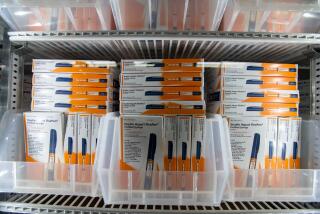California among 15 states suing Amgen over anemia drug
- Share via
New York, California and 13 other states are accusing biotech giant Amgen Inc. of offering kickbacks to medical providers to boost sales across the country of its anemia drug Aranesp, which increasingly has been beset by safety concerns.
In a suit filed Friday in federal court in Massachusetts, the states accuse Amgen sales representatives of encouraging doctors and other healthcare providers to bill insurers for Aranesp that the practitioners received free from the company, according to a statement issued by New York Atty. Gen. Andrew Cuomo.
The practice, which the suit contends was known to Amgen’s upper management, allegedly cost taxpayer-funded Medicaid programs and other insurers millions of dollars in overpayments.
The suit also alleges that Amgen, of Thousand Oaks, conspired with two other defendants -- drug wholesaler ASD Healthcare and group drug-purchasing network International Nephrology -- to offer “illegal inducements” to medical providers to increase sales of Aranesp. These allegedly included sham consulting agreements, weekend retreats and other rewards.
“Drugs should be prescribed to patients on the basis of need, effectiveness and safety, not on a corporate giant’s promise of an all-expense-paid vacation,” Cuomo said. “In an egregious violation of the law, Amgen allegedly bribed medical providers and left taxpayers footing the bill for free drug samples.”
In a statement, Amgen said, “We believe that the allegations are without merit, and we look forward to the opportunity to examine these matters with the states before the court.”
The company said it would not comment further because the case is in litigation.
Mike Kilpatric, a spokesman for AmerisourceBergen Corp., the Pennsylvania-based parent company of ASD Healthcare and International Nephrology (now known as Integrated Nephrology Network), also denied the allegations. He added that his company had received a subpoena from the U.S. Department of Justice “related to the issues set forth in this case” and was cooperating with the government, but declined to provide specifics.
The Justice Department declined to comment.
Aranesp is one of Amgen’s top-selling drugs, though its sales have declined in recent years as safety concerns have mounted. Amgen, which reported revenue of $15 billion in 2008, said sales of Aranesp fell to $3.1 billion last year from $4.1 billion in 2006.
Anemia drugs, including Aranesp and two others produced by Amgen -- Epogen and Procrit -- are given to kidney disease and cancer patients to boost red blood cell production and raise hemoglobin levels.
According to a report on a 2006 congressional hearing, the drugs are the single biggest medication expense for Medicare, another taxpayer-funded insurance program.
Anemia drugs have come under increasing fire after a series of studies found that high doses can lead to increased risk of heart attack, stroke, heart failure and tumor growth in some patients. In 2007, the Food and Drug Administration issued a “black-box warning” for Amgen’s anemia medications -- the strongest warning possible about potential side affects.
The Associated Press reported late Friday that a new study raised fresh safety concerns about the drugs, finding that Aranesp nearly doubled the risk of stroke in people with diabetes and chronic kidney problems who are not yet sick enough to need dialysis.
The lawsuit against Amgen focuses on a practice known as “overfill.” Aranesp is often sold in one-dose vials. Pharmaceutical industry standards require that drug makers include a small amount of medicine in excess of the prescribed dosage -- known as overfill -- in such vials, according to the suit.
However, the suit alleges that at least as far back as 2002, Amgen manufactured Aranesp with overfills that were well above the recommended amounts. According to the suit, the overfill allowed doctors, hospitals and other medical providers to bill their patients’ insurers for medicine that the provider had essentially gotten free.
“In offering the overfill inducement to medical providers, Amgen’s sales force encouraged medical providers to administer higher doses of Aranesp to patients without any clinical need for that higher dose,” the states allege.
Amgen prepared spreadsheets calculating potential revenue from overfill billings that the drug maker’s sales reps could show to their clients during office visits, the lawsuit contends. In the suit, one Amgen saleswoman alleges that she was trained “how to show medical providers the overfill and other economic incentives without leaving any documentation behind.”
The lawsuit describes alleged instances of New York healthcare facilities’ submitting Medicaid reimbursement claims for Aranesp that were ineligible for payment because Amgen’s alleged overfill practices violated the state’s anti-kickback laws.
Between June 2005 and March 2008, for example, a healthcare facility in New York City sought payment from the state’s Medicaid program for at least 3,445 Aranesp treatments that included free overfills, according to the suit. The program paid at least $1.3 million in reimbursements “that were ineligible for payment, due to Amgen’s inducement,” the suit contends.
In another case, the lawsuit alleges that a nurse practitioner at a New York kidney-disease clinic who adopted the overfill billing practice was later paid $31,600 by Amgen over four years to promote Aranesp to other kidney specialists.
The states involved in the lawsuit accuse Amgen of violating a variety of state laws, including fraud, false claims and unjust-enrichment statutes. The suit is seeking triple damages and civil penalties, which in some states amount to $10,000 per violation.
--
More to Read
Inside the business of entertainment
The Wide Shot brings you news, analysis and insights on everything from streaming wars to production — and what it all means for the future.
You may occasionally receive promotional content from the Los Angeles Times.







